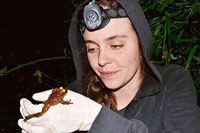Telmatobufo bullocki population discovered on pine forest land owned by Arauco.
A critically endangered frog in Chile is at the center of a wood and pulp product company's effort to become more environmentally friendly. The company, Arauco, postponed a harvest of pine trees in Biobío, Chile after a Chilean biologist from New Zealand's Massey University discovered Bullock frogs (Telmatobufo bullocki) on company land.
Biologist Virginia Moreno said in an article in the Santiago Times that the company has allowed her to research the frog's breeding habits, how the frog moves between the forests and streams, as well as the frog's capability to adapt to changes made to its environment. Of particular concern to Moreno, who is working on her Ph.D, is the quality of the stream water that the frogs depend on. These waters flow through the forests owned by Arauco, and when the company harvests trees, the waters become muddy. This in turn inhibits the growth of algae that Bullock tadpoles need to survive.
“What I really would like is for them not to harvest,” Moreno told the newspaper. “But they’re really aware of the conservation effort. They’re trying to do everything they can to make it right.” Moreno said that the company is making efforts to attain additional environmental certification so it can market its products to consumers who are more environmentally conscious.
The Bullock frog is a brownish-gray colored frog with a stocky body, long legs, and webbed toes. The frog grows to about 3 inches in length and has raised and rounded glands along its back. It breeds in fast-flowing streams and the tadpoles have a sucker-like mouth that is used to attach to rocks as it eats algae.



